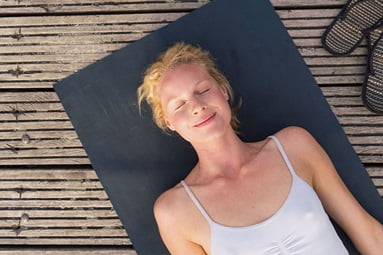
Why you sleep better
Sleep as an elixir of health
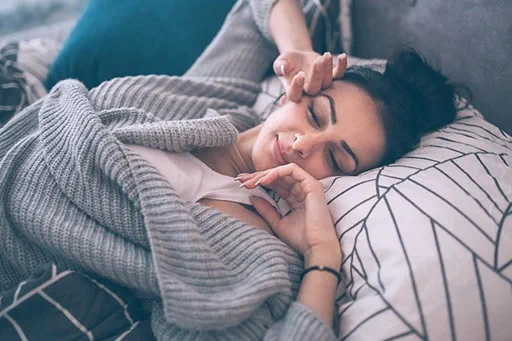
Sleep is much more than simply a break from your hectic waking life. While you are sleeping your memories are consolidated. Studies have shown that the things you learn are anchored in your brain while you are asleep. Newborn babies show how it's done: they sleep up to 20 hours a day and process the things they've experienced and learned. But sleep can do more than just make you smart. Getting enough sleep reduces the risk of obesity and type 2 diabetes, strengthens the immune system and keeps you looking fresh.
Here are some more interesting facts about sleep:
- We wake up as many as 25 times a night but don't remember doing so in the morning.
- The Sleep Research Centre at Loughborough University in the UK has found that women need around 20 minutes more sleep on average than men. This is because the female brain operates more efficiently and therefore needs more time to recover.
- Researchers at the University of Leeds in the UK have claimed that a lack of sleep is a major cause of obesity. This is because a lack of sleep triggers a biochemical reaction in the body that slows the metabolism.
- Scientists at the Department of Neurology at the Medical University of Vienna have found out that women sleep better alone, while men sleep better with another person.
- In deep sleep we swallow only once every ten minutes. This is because, like many bodily functions including our breathing, heart rate and body temperature, the swallowing reflex also decreases during sleep.
- Researchers have calculated that we burn around 60 calories an hour during sleep. But this figure varies depending on our sex, weight and age.
- People spend around a third of their life asleep.
- Every night we lose around half a litre of sweat.
Sleeping disorders? Determine your sleep quality
Having the occasional bad night's sleep is perfectly natural and has no adverse effect on your health. Try to remain calm even if you experience occasional sleep problems. Persistent sleep disorders, on the other hand, should be treated. You can find out if you suffer from a sleep disorder by answering five targeted questions.
SWICA offers its customers support with sleep problems
Sleeping well is essential to our health and quality of life. Anyone who struggles for an extended period of time with falling asleep, staying asleep or waking up too early should seek advice from a specialist. santé24 offers SWICA customers support in the form of a personal coaching call or an online self-help course. Please use the registration form below to sign up for personal sleep coaching.
santé24 – your Swiss telemedicine service
Phone +41 44 404 86 86
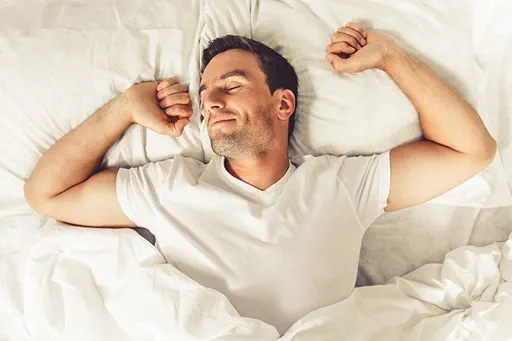
1. Get enough exposure to daylight
Natural daylight is essential for a healthy sleep/wake cycle. It helps make sure you're tired in the evening and sleep better. Researchers have found that people who are exposed to more daylight in the morning fall asleep more quickly at night and sleep through the night better than people who get less daylight.
2. Wear yourself out with exercise
Studies have shown that people who get plenty of exercise during the day sleep better. Not only does physical activity make you tired, but it reduces your levels of stress, which has a positive impact on the quality of your sleep. However, experts at the Max Planck Institute advise against strenuous physical activity right before you go to bed because this gets your circulation going and impairs the quality of your sleep.
3. Appropriate diet
Keeping your blood sugar levels constant helps you relax and fall asleep. A good mix of carbohydrates and protein helps increase levels of the sleep hormone melatonin in the body. So it's better not to avoid carbohydrates in the evening. Steamed vegetables and wholegrain pasta with a low-fat source of protein will make you feel pleasantly full and help you sleep. You should really skip dessert, however, as sweet things raise your blood sugar levels and give you an energy boost. The best time to eat, by the way, is at least three hours before going to bed. This gives the body time to digest. You should also avoid coffee, black tea, fruit juice and other stimulating drinks before going to bed.
While we're on the subject of melatonin: the body's levels of the sleep hormone increase a few hours before you lie down. Many plant-based foods contain large quantities of melatonin. Pulses, for example, are rich in tryptophan, a precursor of melatonin.<
4. Conscious relaxation with PMR or yoga
PMR (progressive muscle relaxation according to Jacobson) and yoga are good for the body and soul, and many relaxation exercises are an excellent remedy for sleeplessness. PMR involves tensing and relaxing your muscles alternately. Consciously experiencing the tension helps you relax. Yoga: forward bends in particular have a soothing effect on the nervous system. Forward bends are any asana that involve bringing your torso and legs together. Here you'll find a gentle 15-minute yoga routine to help you fall asleep and sleep through the night better: go to the Youtube video
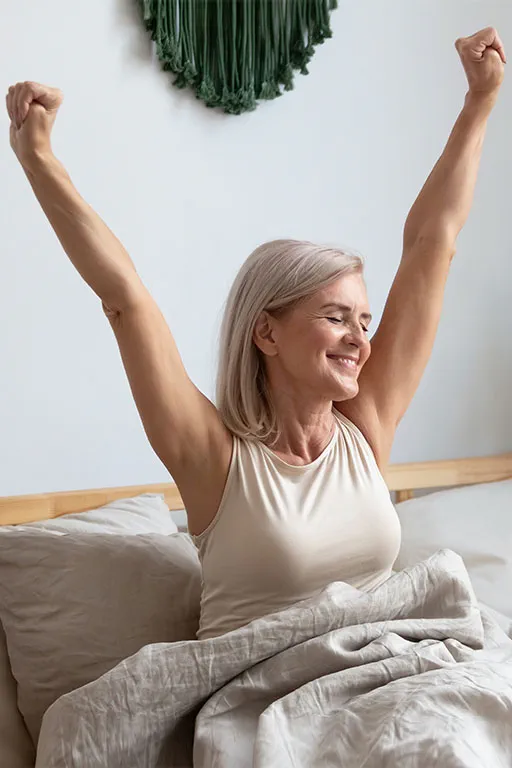
5. Trick your brain
Reviewing the day in reverse (not leaving anything out!) stops the barrage of thoughts and helps you get to sleep.
6. Digital detox
The blue light given off by smartphones, tablets and laptops inhibits the release of the sleep hormone melatonin. Screen activity is also stimulating, which makes it more difficult to settle down. So even if you find it tough, close your laptop and switch off your smartphone at least an hour before you go to bed. Make a habit of it. Ideally, let people know that you're offline from eight in the evening. After a week you'll already find it a lot easier!
7. Sleep in a cool bedroom
Your body temperature falls one or two degrees during sleep, which is why you sleep better in a cool room. The ideal temperature for the room is between 16 and 19 degrees Celsius. This is because if you sweat a lot at night you're more restless and you don't sleep as well. Remember that it is not just menopausal women who sweat at night. This is something that people of any age can experience. A simple home remedy can help: sage tea has an antiperspirant effect. So it's worth drinking a cup of freshly brewed sage tea, which you've allowed to cool to room temperature, twice a day.
8. Sleep deeply with a weight
Weighted or therapy blankets are also said to facilitate calmer sleep. These blankets are 8% to 12% of your weight and are intended to give you a feeling of comfort and security, which prevents you from constantly tossing and turning during the night.
9. Routine is everything
Always go to bed at the same time, and if necessary reduce the amount of time you sleep. If you sleep longer during the day you'll be less tired in the evening. Establish your own personal sleeping ritual: tea, breathing exercises, meditation, writing a journal - anything that helps you wind down is good. The time before you go to bed is yours and yours alone, so enjoy it!
10. Aromas and essential oils
Aromas have a significant influence on our wellbeing and the quality of our sleep. Various studies have demonstrated that inhaling essential oils can stimulate the production of serotonin. This in turn supports the production of melatonin, the sleep hormone. Lavender, lemon balm, bergamot and Swiss pine have a particularly calming effect.
Lavender
Lavender has anxiety-relieving, relaxing, calming and sleep-inducing properties. That's why the "purple miracle" helps with tension and stops the barrage of thoughts. Lavender essential oil can sometimes help just as much as conventional pharmaceuticals if you have sleep disorders. Applications with essential lavender oil help you fall asleep, sleep through the night and wake up well rested. To help you relax you should air out your bedroom well before you go to bed and then spray the room with one or two shots of farfalla organic Good Night Lavender Fragrance Blend. Alternatively you can put a drop of Fine Lavender or Wild Mountain Lavender on a tissue and place it beside your pillow.
Sleep as if you were in a Swiss pine chalet
Essential oil from the Swiss pine (also known as arolia or Cembra pine) has a calming effect, which increases the restorative effect of your night's sleep. You can put one or more drops of Swiss pine oil on an aroma stone and place it near your bed.
Lemon balm and bergamot
Melissa and bergamot have ingredients that help you switch off and get to sleep. Use them as described above.
Soothing aroma bath
Nothing helps you wind down better in the evening than a soothing aroma bath. For a full bath, first fill the bathtub and then add eight to ten drops of skin-friendly essential oil (for example five drops of lavender, three drops of vanilla and no more than two drops of mandarin or bergamot) emulsified in 50 ml of cream or a suitable replacement. Stir it into the water well, get in the tub and enjoy.
Ventilate properly
Our final tip: air out the room properly, and don't combine too many aroma treatments.
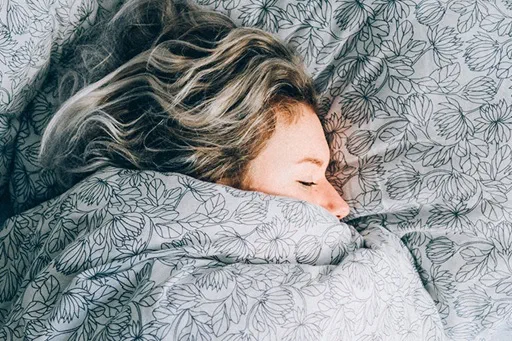
11. Sleep deeply with Swiss pine
The wood of the Swiss pine has long been said to have special properties. A 2003 study by the Joanneum Research Institute in Weiz in Austria revealed that Swiss pine has a positive influence on sleep and the autonomic nervous system. One way in which we are affected by Swiss pine is that it lowers our heart rate.
SWICA – because health is everything
Sleeping well is essential to our health and quality of life. That is why SWICA offers its customers round-the-clock medical assistance from the santé24 telemedicine service. The doctors and medical specialists at santé24 are there to answer all your questions about sleep, preventive healthcare, illness, accident and maternity – 365 days a year. Advice is provided free of charge to SWICA customers.
santé24 – your Swiss telemedicine service
Phone 24/7: +41 44 404 86 86
Would you like to know more about SWICA?
In addition to individual insurance cover for every situation, SWICA offers its customers valuable supplementary services relating to their health. Find out more about your exclusive advantages with SWICA and book a personal consultation for advice. The customer service team looks forward to hearing from you by phone +41 58 800 99 33 or via the contact form below.




